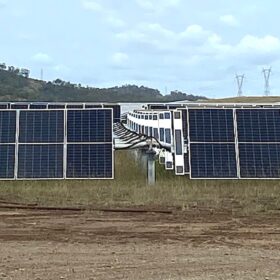ARENA has announced it is providing a $370,000 grant for a feasibility study into a ‘virtual microgrid’ in the Latrobe Valley.
A ‘virtual microgrid’ is a local marketplace of connected energy users who can buy and sell electricity within a set area. With this marketplace, farmers would be able to take greater control of their energy use, allowing them to trade surplus of solar PV generated electricity, and consequently saving money on their energy bills.
The whole project will cost around $775,000 and will be led by Brooklyn-based LO3 Energy. It will integrate around up to 200 dairy farms, 100 household consumers, and around 20 other commercial and industrial customers in the Gippsland region.
Exergy’s LO3 peer-to-peer energy trading platform utilizes the blockchain to allow participants to securely buy and sell locally produced renewable energy. Participants in the scheme would have a combination of solar, battery and smart devices to generate, store and manage energy usage while being linked to the digital marketplace. The AusNet distribution network links the properties.
The study is to end at the end of 2018, and pilot microgrids will be rolled out if it is successful.
According to ARENA CEO Ivor Frischknecht, the feasibility study would be the first step in transitioning one of Victoria’s primary agricultural regions towards renewables, and would be the first trial of a blockchain-based virtual microgrid in Australia.
“With significant increases in distributed energy resources across the network, there is an emerging opportunity to optimize these systems through orchestration.
“The ‘virtual microgrid’ concept brings an alternative approach to these solutions where the control remains with the customers, rather than retailers, who can choose to opt in depending on the current prices and energy types, or their willingness to provide demand response,” Mr Frischknecht said.
Lawrence Orsini, LO3’s founder and CEO said: “This is a landmark project for us and the Australian energy industry as it combines a number of our innovative technologies to optimise the use of renewable energy.”
This content is protected by copyright and may not be reused. If you want to cooperate with us and would like to reuse some of our content, please contact: editors@pv-magazine.com.








By submitting this form you agree to pv magazine using your data for the purposes of publishing your comment.
Your personal data will only be disclosed or otherwise transmitted to third parties for the purposes of spam filtering or if this is necessary for technical maintenance of the website. Any other transfer to third parties will not take place unless this is justified on the basis of applicable data protection regulations or if pv magazine is legally obliged to do so.
You may revoke this consent at any time with effect for the future, in which case your personal data will be deleted immediately. Otherwise, your data will be deleted if pv magazine has processed your request or the purpose of data storage is fulfilled.
Further information on data privacy can be found in our Data Protection Policy.